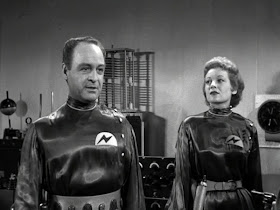This issue: Brecht-Godard-Wood, linked circlets connecting the search for freedom through 'dislodging' cinematic signifiers and turning bare soundstages into ghost ships and surrealist basements. This year's stellar line-up batted down the plate and strewn orchids on the grave of logic.
If through the issue you notice very little Godard, know this: Godard is in all things whether we speak of him or no. There is no going straight from Brecht to Wood. I tried. But my own understanding of film studies comes roundabout through Godard's dedication to Monogram Pictures (whose Return of the Ape Man is discussed) at the start of Breathless.
Also in this mighty issue: Peter K. Tyson decodes the Brechtian intertexutality of Fassbinder's Lola; teenage Molly Marie Wright rages against the empty-headed CGI of the Total Recall remake vs. the paravegan grandeur of Troll 2. Intertextual frisson erupts as Thomas Duke challenges Roger Ebert's perception of 'flaws' in Edgar G. Ulmer's poverty row classic Detour; Chris Stengl exhumes Pauline Kael's 'lost' review of Plan Nine from Outer Space, and I lament the dryness of David Sterritt's Les Carabiniers commentary track. Film historian David Del Valle discusses the joys and inaccuracies of Tim Burton's Ed Wood while acclaimed Nuyorican poet Tracie Morris expresses her misgivings over Burton's Dark Shadows and praises the original 1,000+ episode TV show. We get insightful probes into the basement surrealism of both Val Letwon's The Ghost Ship (from Ethan Spigland), and Ed Wood's Glen or Glenda (from Budd Wilkins). Gregory Cwik discusses metatextual threads in horror via Cabin in the Woods, and I through Halloween.... and through the valley of the shallows of Brecht, we shall find Woodsy depth.
And we learn how Godard's Prénom Carmen explains the truth about UFOs, for, as the great Eros would say, "you didn't actually think you were the only inhabited planet in the universe? How can any race be so stupid?"
And check out Memento Mori, the staggeringly detailed historical action figure comic by our cover artist, Mick Baltes.
If through the issue you notice very little Godard, know this: Godard is in all things whether we speak of him or no. There is no going straight from Brecht to Wood. I tried. But my own understanding of film studies comes roundabout through Godard's dedication to Monogram Pictures (whose Return of the Ape Man is discussed) at the start of Breathless.
 |
| Ed Wood by Mick Baltes |
And we learn how Godard's Prénom Carmen explains the truth about UFOs, for, as the great Eros would say, "you didn't actually think you were the only inhabited planet in the universe? How can any race be so stupid?"
And check out Memento Mori, the staggeringly detailed historical action figure comic by our cover artist, Mick Baltes.



This comment has been removed by a blog administrator.
ReplyDeleteI have that Les Carabiniers disc but haven't listened to that commentary. I'm a little curious now.
ReplyDeleteAnyway, I also think it's essentially a comedy of sorts. Call me crazy, but I find Godard to be largely a comedic director of sorts (only to a slight degree with certain films, like Contempt) who is funnier the darker and more scathing he gets. I once wrote a list of my top 20 favorite comedies of all time, and Week End made that list. That's why I'm not a big fan of Le Petit Soldat, as it completely lacks his particular brand of humor (although it's okay for what it is).
Thanks Thomas, yeah you should listen to that commentary because I feel the exact same way about Godard. His humor is so deadpan that I think lots of academics don't get it. Critics lump Carabiniers in with the much more ragged Petit Soldat, as you say, but it's like comparing Dr. Strangelove with Fail-Safe -- yet that's what some of these profs do... and they're teaching kids every day... teaching them that Godard is not funny, only boring and full of Communist diatribes. No wonder this country's going to hell!
ReplyDeleteThank's for using my pics and for the link.
ReplyDeleteGreetings from Germany